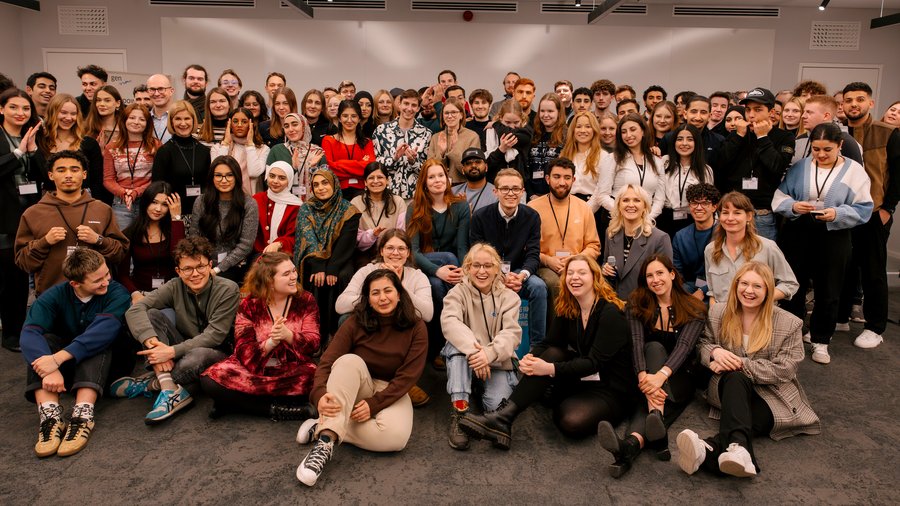Salzburg Global's Corinna Nawatzky urges that youth loneliness should be addressed as "not just a matter of public health but a democratic imperative"
Loneliness has long been seen as an issue affecting mainly older generations—the image of an elderly woman living alone with her beloved pet is a familiar stereotype. However, the COVID-19 pandemic and ongoing global crises have drastically increased feelings of isolation among young people, too. Economic instability, climate anxiety, and geopolitical conflicts have further compounded these experiences, leaving many young individuals feeling disconnected from their communities and uncertain about their future. Several studies confirm this daunting trend among youth, with some indicating that nearly fifty percent of 16- to 30-year-olds experience loneliness.
The recent Change! Youth Empowerment Hub in Berlin, organized by Bertelsmann Stiftung, Peer Leader International e.V., and SV Bildungswerk, placed youth mental health and participation at the heart of the conversation. Over two days, the event brought together nearly one hundred young activists, student representatives, and policy and civil society leaders. Together, they developed strategies that center young people and their well-being while empowering them to drive change.
Through workshops, design thinking challenges, stand-up poetry, and an engaging fishbowl discussion with leading German politicians, one pressing concern stood out above all else: the profound link between youth loneliness and anti-democratic tendencies.
The Link Between Youth Loneliness and Anti-Democratic Tendencies
Research from Das Progressive Zentrum highlights that 75% of young Germans feel they cannot influence politics in their country. This perceived political impotence fosters disengagement, creating fertile ground for anti-democratic sentiments. The study suggests a direct link between loneliness and the erosion of democratic participation, including voting in elections, expressing social solidarity, and trust in political institutions.
Das Progressive Zentrum differentiates between three kinds of loneliness: emotional, social, and collective. Emotional loneliness refers to the absence of close personal relationships, social loneliness to a lack of broader social networks, and collective loneliness to feeling disconnected from society as a whole. These categories are particularly relevant when considering the intersection of loneliness and democracy. Feeling detached from one's community can diminish civic engagement and lead to apathy or alignment with extremist narratives that offer a false sense of belonging.
Addressing youth loneliness is, therefore, not just a matter of public health but a democratic imperative. By strengthening mental health support, we inherently bolster the resilience of our democratic institutions.
Challenges Facing Young Activists
At the same time, conversations at the Change! Youth Empowerment Hub highlighted a vicious cycle experienced by many young people taking action to support their communities: The strong drive to make a difference often leads to overwork and burnout due to multiple obligations and a lack of institutional support. They step back, recover, and then re-engage—only to find themselves repeating the same cycle. Without sustainable structures in place to support their activism and mental well-being, this cycle threatens to exhaust the very individuals most committed to positive social change.
Moreover, the reality of civic engagement is also shaped by socioeconomic and geographic factors. Engaging in after-school activities or youth activism is far more accessible when you grow up in an urban, academic household than if you live in a rural area with parents who do not speak German fluently and no access to public transportation.
Despite these challenges, the diversity of participants and contributions at the event made it clear that young people from all backgrounds want to participate in shaping society. However, whether they can do so depends heavily on the support and opportunities available to them. Many attendees at Change! were supported by organizations such as Start Stiftung and other civil society actors that work specifically to empower youth with a migrant background and other marginalized groups. The need for systemic support cannot be overstated: engagement and activism should not come at the cost of young people’s well-being.
A Continuing Commitment to Youth Well-Being
The intersection of civic engagement and youth well-being is also an ongoing area of focus for Salzburg Global, reinforcing the idea that investing in young people’s mental health is an investment in the future of democracy. In November 2023, Salzburg Global hosted the program "Civic and Civil Education: Identity, Belonging, and Education in the 21st Century", which underscored the vital role of education in fostering democratic societies. One of the initiatives that emerged from the program continues to change the conversation around the concept of hope in education. Another group of Fellows explored how power is often withheld from young people and discussed a framework to decolonize youth engagement: Democracy for Young Sceptics.
Despite these challenges, the level of motivation and connectedness among the participants at the Youth Empowerment Hub was incredibly moving to witness. By the end of the first day of Change!, attendees had already set up a WhatsApp community to continue their discussions, with several follow-up calls planned by various working groups and workshops.
Young people are eager to shape the world around them—the real question is whether society will support or stand in their way.
In 2026, the Salzburg Global Center for Education Transformation will convene a session about mental health and well-being in education. If you would like to partner with us on this session, please get in touch with Dominic Regester and subscribe to our newsletter to stay updated about the event and our wider work.


